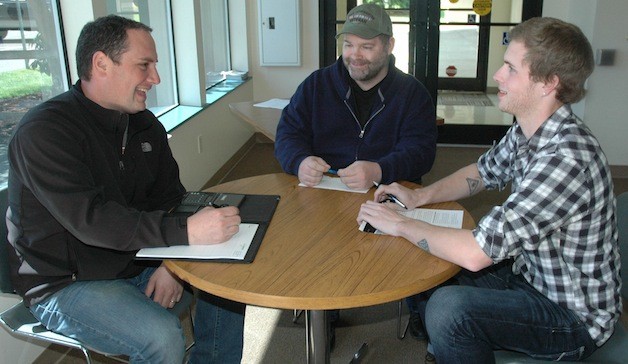ARLINGTON — Justin Brackett found out he no longer had a job when he woke up and checked Facebook on his phone.
Brackett was one of more than 160 employees of MicroGreen Polymers in Arlington whose employment ended when the company closed suddenly April 3.
“I didn’t make much money, but I believed in what I was doing,” said Brackett, a former graveyard shift lead. He joined coworkers at an April 15 WorkSource meeting. “We were treated with respect, not belittled. Whoever you were, your voice was heard. With the work we were doing, for recycling and the environment, it was like jumping into the future. It could have been the start of something huge.”
MicroGreen began recycling plastic products in Arlington in 2002. The company raised more than $40 million from outside investors including the Stillaguamish Tribe of Indians and Waste Management. Its “InCycle” recyclable coffee cups were used on airlines including Alaska Air, United and Virgin America. MicroGreen executives were so confident of future expansion that they asked Gov. Jay Inslee to widen Highway 531 in January.
Company executives were talking about expansion in January when Gov. Jay Inslee toured the facility in Jensen Business Park near Highway 9.
Others echoed not only Brackett’s affection for his coworkers and admiration for their mission, but also their dismay and disbelief with how suddenly it all ended.
Tony La Salata was a director of engineering for MicroGreen by the time his five years with the company ended. Not only did he see a business that was surviving, but he cited several signs that it was thriving.
“We were installing new equipment until the day we were all let go,” La Salata said. “On Wednesday, everything seemed to be on the up-and-up, but by Friday, it wasn’t. We weren’t just meeting our production numbers, but seeing upticks in them.”
Although La Salata took care to describe MicroGreen as “a great company with good people and wonderful business ethics,” he admitted that their lack of communication in the wake of their shutdown had sown confusion.
“I don’t think there was any ill will on their part, but they’re just not talking to us,” La Salata said. “We have no idea what their plans are for the technology that was left after we shut the switches off. I’ve got vendors calling me with questions, and we’re clueless.”
La Salata speculated that the company likely closed due to “investor fatigue.”
Printer operator Vern Nickol recalled MicroGreen as a friendly, well-organized work environment that treated its people generously, while construction worker Adrian Murphy observed that their former employer seemed to be working toward already established, tangible goals.
“One of our last weeks there, we ran the most that we’d ever run,” production shift Brian Garner said. “We were a close-knit crew, working as hard as we could and doing our best, so it’s a shame they closed the doors on us.”
While production assistant Shanda Miller acknowledged that she and her husband would no longer be able to buy a much-needed replacement car, she faced this prospect with the same stoicism as her coworkers.
“You just adjust the best that you can, and reassess where you’re at,” Garner said. “It’s all about setting yourself up with the next plan of action to take care of your family.”
Like Brackett, Miller and La Salata believe that MicroGreen anticipated a growing need.
“Everybody’s trying to go green, and we thought we could start small but eventually go global in doing that,” said Miller, who started an invitation-only Facebook group for former MicroGreen employees to stay in touch.
Representatives of MicroGreen have not responded to contact attempts.



